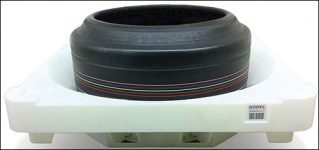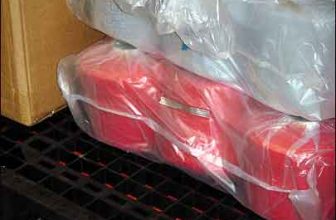
Güdel Group uses RFID technology to automate the tire production process
[ad_1]
The Güdel Group produces high-precision mechanical components, automation systems, and reusable transport items (RTIs) used by automobile and tire manufacturers. The Swiss company recently started to provide RFID solutions to help auto tire companies automate their production processes. The solution uses a tray with RFID tags provided by Schreiner ProTech.
Before vulcanization, the tire is sticky and soft and is called a green tire. Stefan Güdel, the company’s tire pallet project manager, said: “Viscosity complicates the handling process. Because of its softness, green tires need to be handled carefully to avoid damage and quality problems.”

(Each green tire tray is attached with an RFID tag with a barcode and Güdel logo printed on the tag)
To solve this problem, Güdel has developed a green tire tray, an RTI item that can transport tires during the production process. Using this pallet, employees can take out the green tire without damaging it. The pallet can hold up to 900 mm diameter and 30 kg tires.
In order to automate the tire production process, the tray is also equipped with RFID tags. After the reader finishes reading the tag data, the data will be transferred to the manufacturer’s PLC. Then, by controlling the storage time and variables that can withstand dirt, the PLC can use this information to prevent damage to the tire. With the release of the program, Güdel’s customers have used 2,000 pallet products for tire production.
During the production process, each green tire is placed in a pallet and conveyed by a conveyor belt. Normally, green tires are made of rubber, textiles and steel cords. When all the components are assembled, the semi-finished product will be sent to the automatic storage and retrieval system (AS/RS) to store the green tire before curing.
In the production process, the types and sizes of different tires are also different. Due to the sensitive nature of green tires, manufacturers usually use manual methods to transport tires from the assembly line to the vulcanization process. Similarly, companies can also use automated systems that increase the cleaning and maintenance of tire handling equipment, but such automated systems also increase the risk of tire damage.
According to Frank Linti, RFID business development manager of Schreiner LogiData, a 13.56 MHz Schreiner ProTech high-frequency passive tag with a size of 50mm*50mm is attached to the tray, which is compatible with the ISO 15693 standard. Linti said: “The customer needs a label that can be coded to the unique identifier of the pallet. The label needs strong adhesion. The label must be dirt-resistant, washable and abrasion resistant.”
In addition, Güdel also printed a bar code on the RFID label, which is used when the label is abnormal. Linti explained: “We provide pre-programmed, printed barcodes and Güdel Logo labels. For protection during the washing process, we also provide a transparent coating.[层压]. “
Due to the presence of dust and steam, the use of RFID tags in tire factories is facing great challenges. These pollutants will affect the scanning ability. Linti said: “In environments with more pollutants, we also hope that RFID can provide more durable and stable performance. Barcodes indicate that they will be contaminated over time.”

(Güdel’s RFID solution uses Rockwell RFID readers to read pallet tag data)
Güdel’s RFID solution uses Rockwell RFID readers to read the pallet tag data, and then upload it to the PLC and the user’s own manufacturing management software.
For the equipment running AS/RS, an RFID reader is installed near the Z-axis carriage near the telescopic fork and near the tray where the tire is placed.
First, the new tire is associated with the pallet tag ID. After the Rockwell reader reads the tag, the user enters tire-related information, including product number, size, and type. This information will be written into the pallet label along with the time and date.
Güdel said: “Using RFID technology on the pallet, each tire and its production data will be read.”
The company will also analyze the data to confirm the time and time-consuming of each process of the tire. This data will also help the company track how often pallets are used, thereby optimizing replacement, cleaning or maintenance processes.
(Exclusive manuscript of rfid world network, please indicate the source author for reprinting!)
[ad_2]




